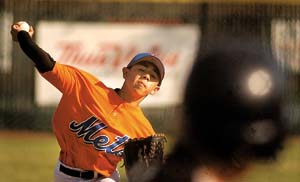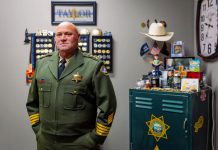Deriving their nickname from the deafening sound booming from
thousand-dollar speakers and high-quality amplifiers,
”
boom cars
”
are popular with a wide range of people, but can cost big money
in tickets if nabbed by police.
Hollister – Deriving their nickname from the deafening sound booming from thousand-dollar speakers and high-quality amplifiers, “boom cars” are popular with a wide range of people, but can cost big money in tickets if nabbed by police.
Cars that have stereo systems which resonate loud, booming music have been dubbed “boom cars” by critics and are creating a backlash across the country and state – with some police departments impounding cars and others smashing stereos with sledge hammers to quiet the blaring music.
And although many drivers are aware of the California law that states a car stereo audible from 50 feet – the width of some city streets – is illegal, they’re spending thousands of dollars to draw attention to their systems. Unfortunately for them, it’s often the attention of police officers they get.
“You can’t hear sirens, it distracts other people – mainly it just impairs your ability to hear,” said Hollister Police Capt. Richard Vasquez. “If we hear them, we will cite them. I wouldn’t say we do a lot, but we do a few.”
A citation in San Benito County isn’t cheap. A first-time offender has to cough up $146, and any ticket after that adds an additional $30 to $40 to the fine, according to San Benito County Superior Court personnel.
But for some people with a need for noise, the fines are a small price to pay for their music, said Gabriel Nunez, co-owner of Hollister Auto Stereo on San Felipe Road.
Men and women, ranging from teenagers to adults in their 60s come into Nunez’s shop on a daily basis asking for bigger, better and louder stereos, he said. And they aren’t afraid to pay handsomely for them.
Teenagers who stop by after school have doled out between $1,000 to $3,000 for a loud system, he said.
“I’ve had guys even break out their windows and they have to come in and reinforce the vehicle with a (special material) because the car rattles so much. Some have even broken the factory welds,” Nunez said. “We get guys in here where the majority of their paychecks go to paying tickets.”
Although Nunez said other motorists often complain to the drivers of these cars, and some of them pay big dollars in fines from the cops, Hollister’s police are lenient compared to some cities around the nation that are cracking down on noise scofflaws: Police in Lorain, Ohio, last year began smashing noisy stereos with sledgehammers, enforcing a law that says stereos must be confiscated on a second offense.
The East Bay city of Richmond recently imposed higher fines and harsher penalties – including impounding vehicles for up to one month – for vehicles audible more than 25 feet away.
Groups that seek to galvanize fellow boom car critics can easily be found online, encouraging citizens to report problems to police or petition city leaders to impose new laws.
But due to the severe staffing shortage at the Hollister Police Department, Vasquez said officers usually only cite drivers if the music is extremely loud and they have time in between other calls for service.
“A lot depends on where we’re going at the time,” Vasquez said. “If we have the ability to, we will pull them over and issue a citation. It’s a nuisance, and it is a violation of the law.”
Some research has shown that excessively loud noise can be more than a nuisance. Sound waves that rattle the bones can be a health hazard, and loud noise can cause people to react with anxiety and irritability, causing a faster pulse and higher blood pressure.
Excess noise exposure is the No. 1 cause of hearing loss, according to the American Hearing Research Foundation.
A normal conversation registers about 60 decibels, which is also the noise level of a sewing machine or typewriter. Continual exposure to more than 85 decibels – a bit quieter than the volume of a lawn mower – can cause permanent hearing damage, experts believe.
A lawnmower is about 90 decibels, while a rock concert is about 120 – a level that is only recommended for 15 minutes of exposure without protection. Car stereos can register above 154 decibels.
With the weather growing warmer and drivers spending more time on the road, more attention may be focused on boom cars.
“In the summer there’s probably a slight increase,” Vasquez said.
Staff Writer Lori Stuenkel contributed to this report.
Erin Musgrave covers public safety for the Free Lance. Reach her at 637-5566, ext. 336 or em*******@***********ws.com










